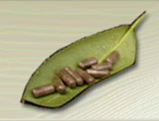 Sanskrit name: Dadima
Sanskrit name: Dadima
Botanical name: Punica granatum
Habitat: One of the important centers of wild pomegranate in Himachal Pradesh is Darlaghat, which is located about 50 km from Shimla. The word Darlaghat literally means a pass or place of wild pomegranate-trees in India. An erect deciduous spreading shrub or tree can be 8 to 10 meters high; stern, woody and thorny; girth of main stem, 48 to 78 cm; wood, very hard and light yellow; leaves shed in December, new light red leaves appear in the middle of March, new growth, very ornamental. Fruit is globular, crowned by a persistent calyx, possessing a hard outer rind with a red tinge. Seeds are angular, with a fleshy aril which constitutes the edible part. Color varies from red to pinkish white.
Energetics:
- Rasa (taste): Sweet, Astringent, Sour
- Virya (action): Heating
- Vipaka (post-digestive effects): Sweet
- Doshas (constitution): Balances vata, pitta and kapha
General information
Pomegranate is naturally loaded with Sucrose and Glucose, and that's why its juice works like an energy booster. Pomegranate seeds have a cooling effect on the digestive system and helps in purifying blood. Thus pacifying Pitta Dosha. The fruit contains many essential minerals and nutrients like fats, carbohydrates, potassium, magnesium, iron, sugar, vitamin C, calcium, which renders its healing properties.
Related products

 Loading... Please wait...
Loading... Please wait...













